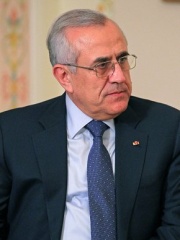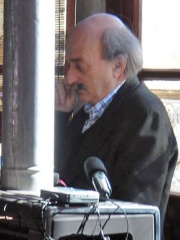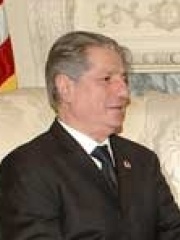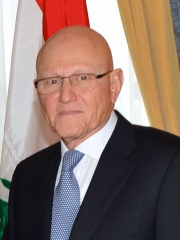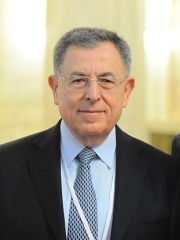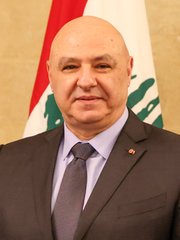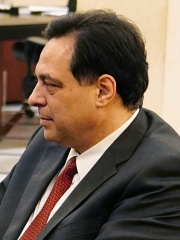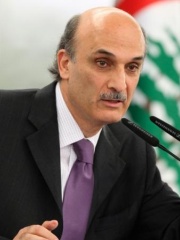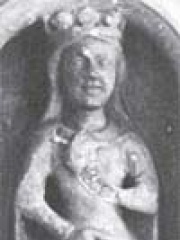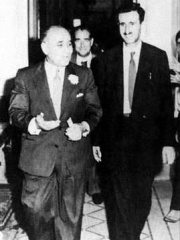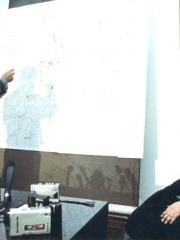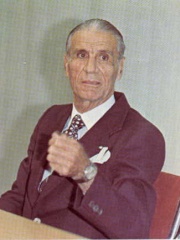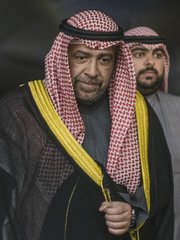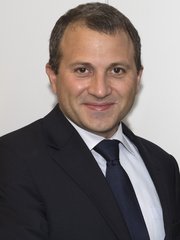
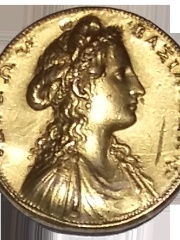

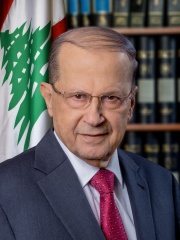
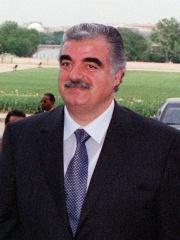
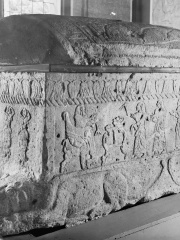
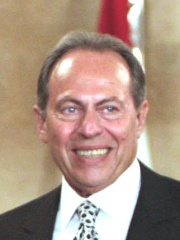
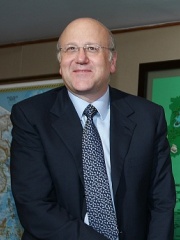
The Most Famous
POLITICIANS from Lebanon
This page contains a list of the greatest Lebanese Politicians. The pantheon dataset contains 19,576 Politicians, 50 of which were born in Lebanon. This makes Lebanon the birth place of the 65th most number of Politicians behind Australia, and Cuba.
Top 10
The following people are considered by Pantheon to be the top 10 most legendary Lebanese Politicians of all time. This list of famous Lebanese Politicians is sorted by HPI (Historical Popularity Index), a metric that aggregates information on a biography's online popularity. Visit the rankings page to view the entire list of Lebanese Politicians.

1. Severus Alexander (208 - 235)
With an HPI of 84.39, Severus Alexander is the most famous Lebanese Politician. His biography has been translated into 75 different languages on wikipedia.
Marcus Aurelius Severus Alexander (1 October 208 – March 235), also known as Alexander Severus, was Roman emperor from 222 until 235. He was the last emperor from the Severan dynasty and was the youngest sole emperor of the united Roman Empire (aged 13). When Alexander took power he was aged 13, and succeeded his slain cousin, the 18-year-old Emperor Elagabalus, whose adopted son and heir he had been. Alexander and his predecessor were both grandsons of Julia Maesa, who was the sister of the empress Julia Domna and had arranged for Elagabalus's acclamation as emperor by the Third Gallic Legion. Elagabalus had been murdered along with his mother Julia Soaemias by his own guards, who, as a mark of contempt, had the two bodies cast into the Tiber river. Alexander's 13-year reign was the longest reign of a sole emperor since Antoninus Pius and in peace proved prosperous. However, Rome faced military threats from the rising power of the Sassanid Empire, as well as growing incursions from the tribes of Germania. Alexander managed to check the threat of the Sassanids, but when campaigning against Germanic tribes, he attempted to bring peace by engaging in diplomacy and bribery. This policy alienated many in the Roman army, leading to a conspiracy that resulted in the assassination of Alexander, along with his mother Julia Avita Mamaea and his advisors. He was succeeded by Maximinus Thrax. Alexander's death constituted the epoch event for the Crisis of the Third Century, bringing in its wake nearly fifty years of civil war, foreign invasion, and the collapse of the monetary economy. Because of his mother, he was nicknamed Mamaeas (Μαμαίας).

2. Dido (879 BC - 759 BC)
With an HPI of 78.36, Dido is the 2nd most famous Lebanese Politician. Her biography has been translated into 51 different languages.
In Greek and Roman mythology, Dido ( DY-doh; Classical Latin: [ˈdiːdoː]; Ancient Greek: Διδώ [diːdɔ̌ː]), also known as Elissa ( il-ISS-ə; Greek: Ἔλισσα), was the legendary founder and first queen of the Phoenician city-state of Carthage. In most accounts, she was originally the joint ruler of Tyre who fled tyranny to found her own city in northwest Africa, now modern-day Tunisia. As she is only known from ancient Greek and Roman sources, all of which were written well after Carthage's founding, her historicity remains uncertain. Details about Dido's character, life, and role in the founding of Carthage are best known from Virgil's epic poem, the Aeneid, published around 19 BC. The poem tells the legendary story of the Trojan hero Aeneas. In the poem, Dido is described as a clever and enterprising woman who founded Carthage after fleeing her tyrannical brother. The city prospers under her leadership until Aeneas arrives and the pair fall in love through Juno and Venus' divine intervention. When Aeneas eventually has to leave Carthage, the love-sick Dido commits suicide upon a pyre. Dido has been an enduring figure in Western culture, literature, and art from the early Renaissance into the 21st century.

3. Ahab (900 BC - 852 BC)
With an HPI of 76.10, Ahab is the 3rd most famous Lebanese Politician. His biography has been translated into 50 different languages.
Ahab (, AY-habb; Hebrew: אַחְאָב, romanized: ʾAḥʾāḇ; Akkadian: 𒀀𒄩𒀊𒁍, romanized: Aḫâbbu; Koine Greek: Ἀχαάβ, romanized: Akhaáb; Latin: Achab) was a king of Israel, the son and successor of King Omri, and the husband of Jezebel of Sidon, according to the Hebrew Bible. He is depicted in the Bible as a Baal worshipper and is criticized for causing moral decline in Israel, though modern scholars question this. The existence of Ahab is historically supported outside the Bible. The contemporary Kurkh Monolith inscription of king Shalmaneser III from the Neo-Assyrian Empire documented in 853 BC that Shalmaneser III defeated an alliance of a dozen kings in the Battle of Qarqar; one of these was Ahab. Though not named, he is also mentioned on the inscriptions of the Mesha Stele. Ahab became king of Israel in the thirty-eighth year of King Asa of Judah, and reigned for twenty-two years, according to 1 Kings 16:29. William F. Albright dated his reign to 869–850 BC, while Edwin R. Thiele offered the dates 874–853 BC. Most recently, Michael Coogan has dated Ahab's reign to 871–852 BC.

4. Michel Aoun (b. 1935)
With an HPI of 74.23, Michel Aoun is the 4th most famous Lebanese Politician. His biography has been translated into 64 different languages.
Michel Naim Aoun (Arabic: ميشال نعيم عون, Lebanese Arabic: [miˈʃæːl naˈʕiːm ʕawn]; born 18 February 1935) is a Lebanese politician and former general who served as the 13th president of Lebanon from 31 October 2016 to 30 October 2022. Born in Haret Hreik to a Maronite Christian family, Aoun joined the Military Academy in 1955 and graduated as an artillery officer in the Lebanese Army. In 1984, he became the youngest Commander of the Army, at the age of 49. On 22 September 1988, during the fourth phase of the Lebanese Civil War, the departing President Amine Gemayel appointed him as the interim Prime Minister of a military government after the parliament failed to elect a new president, and dismissed the current government headed by the Acting Prime Minister Selim Hoss. This controversial decision saw the rise of two rival governments contending for power at that time, with Aoun being supported mainly by Christians and Iraq, while the other being supported by Muslims and Syria. Aoun declared the War of Liberation against Syrian Army forces on 14 March 1989, opposed the Taif Agreement, refused to recognize the newly elected presidents René Moawad and Elias Hrawi, clashed with the Lebanese Forces led by Samir Geagea, and survived an assassination attempt on 12 October 1990. On 13 October, the Syrian forces launched a decisive operation against Aoun, invading his strongholds including the Presidential Palace in Baabda and killing hundreds of Lebanese soldiers and civilians. Aoun fled to the French Embassy in Beirut where he declared his surrender and was later granted asylum in France where he lived in exile for 15 years. In exile, Aoun founded the Free Patriotic Movement, and advocated for the Syria Accountability Act by testifying in the US Congress. In 2005, a chain of widespread demonstrations triggered by the assassination of Rafic Hariri erupted in Lebanon, resulted in the withdrawal of Syrian troops from the country. On 7 May, Aoun returned to Lebanon. Aoun was elected to the Parliament for the first time in the same year, while his party won 21 seats in the parliament, forming the largest Christian bloc, and second biggest bloc in the Parliament. In 2006, he signed a memorandum of understanding with Hezbollah, starting a major alliance that has remained ever since. Despite the bloody history with the regime of Hafez al-Assad, father of Bashar al-Assad, Aoun visited Syria in 2008, ending his long rivalry with Damascus. In 2016, Aoun reconciled with Geagea after signing the Maarab Agreement, and was endorsed by the Lebanese Forces, Future Movement, Progressive Socialist Party as well as Hezbollah to be elected the thirteenth president of Lebanon, succeeding Michel Suleiman. He was the oldest president of Lebanon to take office, at the age of 83. In 2019, the country descended into chaos with a popular uprising, bringing millions of Lebanese in Lebanon and abroad to take to the streets, mainly caused by the liquidity crisis, political corruption and sectarianism.
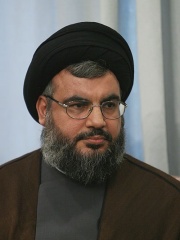
5. Hassan Nasrallah (1960 - 2024)
With an HPI of 74.00, Hassan Nasrallah is the 5th most famous Lebanese Politician. His biography has been translated into 80 different languages.
Hassan Nasrallah (31 August 1960 – 27 September 2024) was a Lebanese cleric and politician who served as the third secretary-general of Hezbollah, a Shia Islamist political party and militia, from 1992 until his assassination in 2024. Born into a Shia family in the suburbs of Beirut in 1960, Nasrallah finished his education in Tyre, when he briefly joined the Amal Movement, and afterward at a Shia seminary in Baalbek. He later studied and taught at an Amal school. In 1982, Nasrallah served as a founding member of Hezbollah, which was formed to fight the 1982 Israeli invasion of Lebanon, declaring that its confrontation with Israel "should only end when it has been removed from existence". After a brief period of religious studies in Iran, Nasrallah returned to Lebanon and became Hezbollah's leader after his predecessor, Abbas al-Musawi, was assassinated by an Israeli airstrike in 1992. Under Nasrallah's leadership, Hezbollah acquired rockets with a longer range, which allowed them to strike at northern Israel. Israel withdrew its forces in 2000 after the 18-year occupation of southern Lebanon, a decision widely considered in Lebanon to have been due to Hezbollah's attacks. The date of Israeli withdrawal is celebrated as a public holiday in Lebanon. Hezbollah cultivated Nasrallah's media image as a charismatic authority, though this image was later weakened. Hezbollah's role in ambushing an Israeli border patrol unit, leading up to the 2006 Lebanon War, was subject to criticism, though Nasrallah projected the end of the war as a Lebanese and Arab victory. During the Syrian civil war, Hezbollah fought on the side of the Syrian government (Al Assad) against what Nasrallah termed "Islamist extremists". However, several figures and organizations asserted that Nasrallah was responsible for massacres of Sunni Muslims. Nasrallah also promoted the "Axis of Resistance", an informal coalition of Iran-backed groups focused on opposing Israel and the United States. After the October 7 attacks followed by war, Hezbollah engaged in support of Hamas in ongoing conflict that impacted both sides of the Israeli-Lebanese border. On 27 September 2024, Nasrallah was killed when the Israeli air force attacked Hezbollah's Headquarters.

6. Rafic Hariri (1944 - 2005)
With an HPI of 73.77, Rafic Hariri is the 6th most famous Lebanese Politician. His biography has been translated into 62 different languages.
Rafic Bahaa El Deen al-Hariri (Arabic: رفيق بهاء الدين الحريري, romanized: Rafīq Bahāʾ ad-Dīn al-Ḥarīrī; 1 November 1944 – 14 February 2005) was a Lebanese businessman and politician who served as prime minister of Lebanon from 1992 to 1998 and again from 2000 to 2004. Hariri headed five cabinets during his tenure. He was widely credited for his role in constructing the Taif Agreement that ended the 15-year Lebanese Civil War. He also played a huge role in reconstructing the Lebanese capital, Beirut. He was the first post-civil war prime minister and the most influential and wealthiest Lebanese politician at the time. During Hariri's first term as prime minister, tensions between Israel and Lebanon increased, as a result of the Qana massacre. In 2000, during his second premiership, his biggest achievement was the Israeli withdrawal from Southern Lebanon, ending an 18-year old occupation, while his government solidified relations with Ba'athist Syria. On 14 February 2005, Hariri was assassinated in a suicide truck bomb explosion in Beirut. Four Hezbollah members of Unit 121 were indicted for the assassination and were tried in absentia by the Special Tribunal for Lebanon. Salim Ayyash, the unit's leader was convicted for his role in the assassination. The Tribunal eventually convicted three Hezbollah members before its closure in 2023, but stated that it could find no evidence that the bombing had been directed by the group's senior leadership. The assassination was a catalyst for dramatic political change in Lebanon. The massive protests of the Cedar Revolution helped achieve the withdrawal of Syrian troops and security forces from Lebanon and a change in government. At one point, Hariri was one of the world's 100 wealthiest men and the fourth-richest politician.

7. Hiram I (1000 BC - 935 BC)
With an HPI of 72.58, Hiram I is the 7th most famous Lebanese Politician. His biography has been translated into 26 different languages.
Hiram I (Phoenician: 𐤇𐤓𐤌 Ḥirōm 'my brother is exalted'; Hebrew: חירם Ḥīrām; also called Hirom or Huram) was the Phoenician king of Tyre according to the Hebrew Bible. His regnal years have been calculated by some as 980 to 947 BC, in succession to his father, Abibaal. Hiram was succeeded as King of Tyre by his son Baal-Eser I. Hiram is also mentioned in the writings of Menander of Ephesus (early 2nd century BC), as preserved in Josephus's Against Apion, which adds to the biblical account. According to Josephus, Hiram lived for 53 years and reigned 34.

8. Émile Lahoud (b. 1936)
With an HPI of 70.27, Émile Lahoud is the 8th most famous Lebanese Politician. His biography has been translated into 42 different languages.
Émile Jamil Lahoud (born 12 January 1936) is a Lebanese politician who served as the 11th president of Lebanon from 1998 to 2007. During his presidency, the Israeli occupation of Southern Lebanon, that had lasted since 1982, ended in May 2000. He downplayed sectarianism and rearmed the Lebanese army, with help from Syria. Lahoud was closely allied to Syrian president Bashar al-Assad during the Syrian occupation of Lebanon, and was seen as playing a key role in preserving the occupation.

9. Najib Mikati (b. 1955)
With an HPI of 68.63, Najib Mikati is the 9th most famous Lebanese Politician. His biography has been translated into 53 different languages.
Najib Azmi Mikati (born 24 November 1955) is a Lebanese politician and businessman who served as the 52nd prime minister of Lebanon from 2021 to 2025. He also served in this post as the 48th and 45th prime minister from 2011 to 2014 and in 2005, after holding the post of Minister of Public Works and Transport from December 1998 to 2003. In 2005, he headed an interim government that supervised the 2005 general election following the withdrawal of Syrian troops. In 2011, he formed his second government, backed by the March 8 alliance, before he resigned in 2013. He was a member of parliament for Tripoli from 2000 to 2005 and was re-elected in 2009 and 2018. In July 2021, he was designated as prime minister and assumed office on 10 September 2021. He went on to lose the parliamentary consultations on 13 January 2025 against ICJ president Nawaf Salam, receiving only 9 votes to Salam's 84. According to Forbes, Najib Mikati is the richest man in Lebanon along with his brother Taha Mikati, with each having a net worth of $2.8 billion in 2023. In 2019, state prosecutor Ghada Aoun accused Mikati of corruption and pressed charges of illegitimate enrichment via subsidised housing loans against him. The charges were dismissed on 3 February 2022 by judge Charbel Bou Samra. In 2023, an investigation in Monaco cleared him of any wrongdoing due to "insufficient evidence," and he has said that the accusations against him were politically motivated. Mikati has been linked to former Syrian president Bashar al-Assad, as he made his fortune by operating several telecom projects in Syria and Lebanon in the early 2000s.
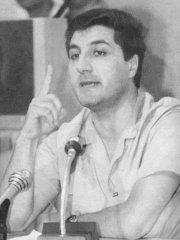
10. Bachir Gemayel (1947 - 1982)
With an HPI of 67.84, Bachir Gemayel is the 10th most famous Lebanese Politician. His biography has been translated into 35 different languages.
Bachir Pierre Gemayel (Arabic: بشير بيار الجميّل, pronounced [baˈʃiːr ʒɪˈmajjɪl]; 10 November 1947 – 14 September 1982) was a Lebanese militia commander who led the Lebanese Forces, the military wing of the Kataeb Party, in the Lebanese Civil War and was elected President of Lebanon in 1982. He founded and later became the supreme commander of the Lebanese Forces, uniting major Christian militias by force under the slogan of "Uniting the Christian Rifle". Gemayel allied with Israel and his forces fought the Palestine Liberation Organization and the Syrian Army. He was elected president on 23 August 1982, but was assassinated before taking office on 14 September, via a bomb explosion by Habib Shartouni, a member of the Syrian Social Nationalist Party. Gemayel is described as the most controversial figure in the history of Lebanon. He remains popular among Maronite Christians, where he is seen as a "martyr" and an "icon". Conversely, he has been criticized for committing alleged war crimes and accused of treason for his relations with Israel.
People
Pantheon has 50 people classified as Lebanese politicians born between 1000 BC and 1972. Of these 50, 17 (34.00%) of them are still alive today. The most famous living Lebanese politicians include Michel Aoun, Émile Lahoud, and Najib Mikati. The most famous deceased Lebanese politicians include Severus Alexander, Dido, and Ahab. As of April 2024, 3 new Lebanese politicians have been added to Pantheon including Joseph Aoun, Ahmad Al-Fahad Al-Ahmed Al-Sabah, and Gebran Bassil.
Living Lebanese Politicians
Go to all RankingsMichel Aoun
1935 - Present
HPI: 74.23
Émile Lahoud
1936 - Present
HPI: 70.27
Najib Mikati
1955 - Present
HPI: 68.63
Michel Suleiman
1948 - Present
HPI: 66.74
Walid Jumblatt
1949 - Present
HPI: 66.02
Amine Gemayel
1942 - Present
HPI: 65.90
Tammam Salam
1945 - Present
HPI: 65.69
Fouad Siniora
1943 - Present
HPI: 65.43
Joseph Aoun
1964 - Present
HPI: 64.93
Hassan Diab
1959 - Present
HPI: 63.88
Samir Geagea
1952 - Present
HPI: 61.33
Elie Saab
1964 - Present
HPI: 58.27
Deceased Lebanese Politicians
Go to all RankingsSeverus Alexander
208 - 235
HPI: 84.39
Dido
879 BC - 759 BC
HPI: 78.36
Ahab
900 BC - 852 BC
HPI: 76.10
Hassan Nasrallah
1960 - 2024
HPI: 74.00
Rafic Hariri
1944 - 2005
HPI: 73.77
Hiram I
1000 BC - 935 BC
HPI: 72.58
Bachir Gemayel
1947 - 1982
HPI: 67.84
Maria of Montferrat
1192 - 1212
HPI: 66.59
Kamal Jumblatt
1917 - 1977
HPI: 66.46
Alfonso Jordan
1103 - 1148
HPI: 65.30
Abbas al-Musawi
1952 - 1992
HPI: 65.08
Pierre Gemayel
1905 - 1984
HPI: 64.85
Newly Added Lebanese Politicians (2025)
Go to all RankingsJoseph Aoun
1964 - Present
HPI: 64.93
Ahmad Al-Fahad Al-Ahmed Al-Sabah
1963 - Present
HPI: 47.65
Gebran Bassil
1970 - Present
HPI: 46.02
Overlapping Lives
Which Politicians were alive at the same time? This visualization shows the lifespans of the 23 most globally memorable Politicians since 1700.

